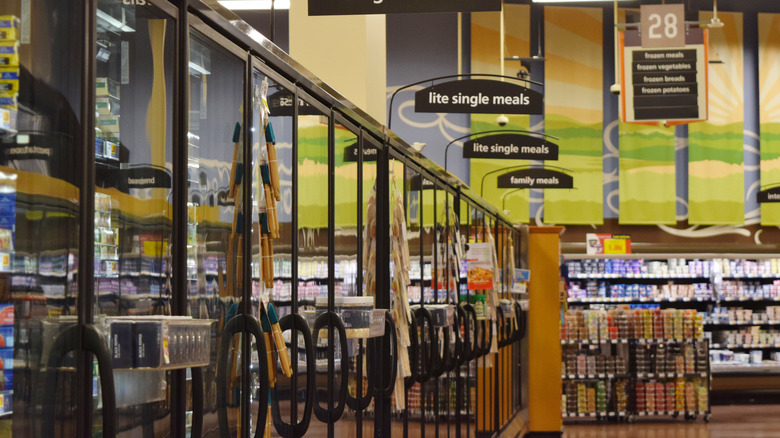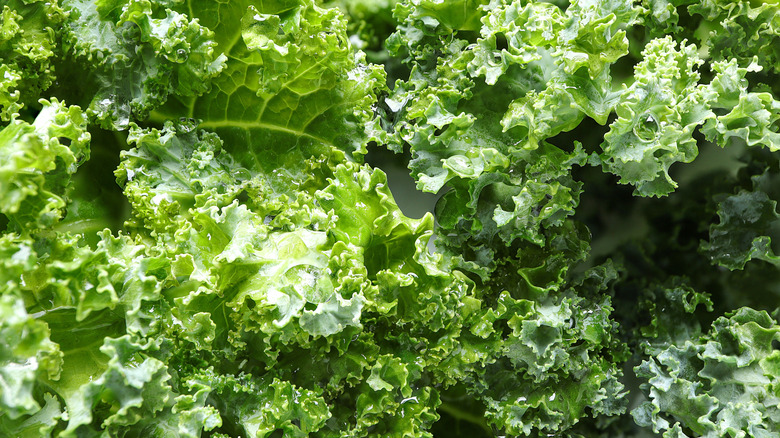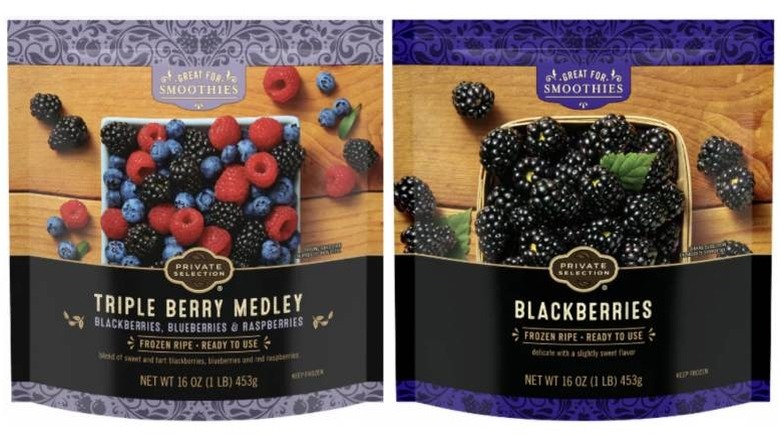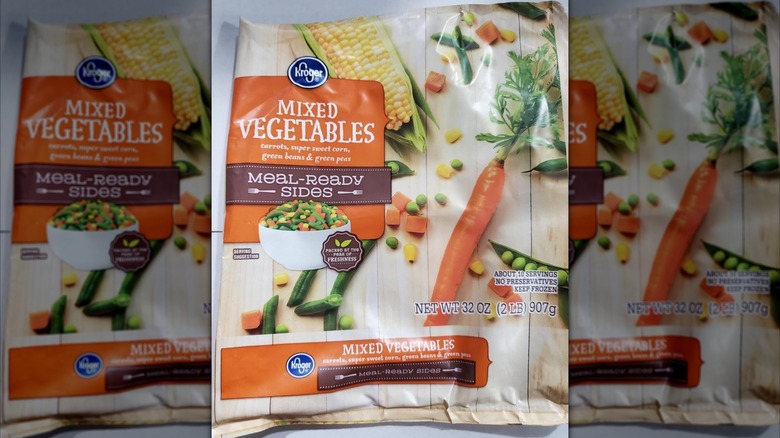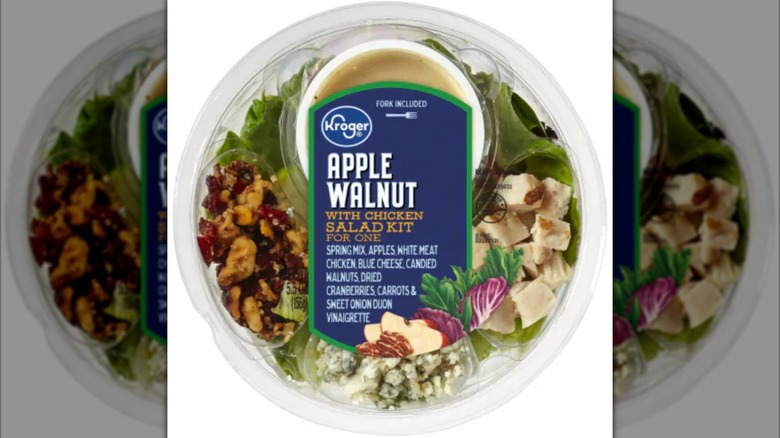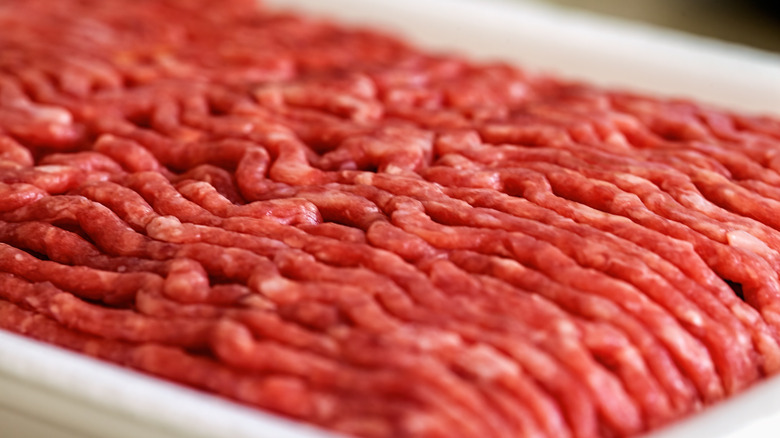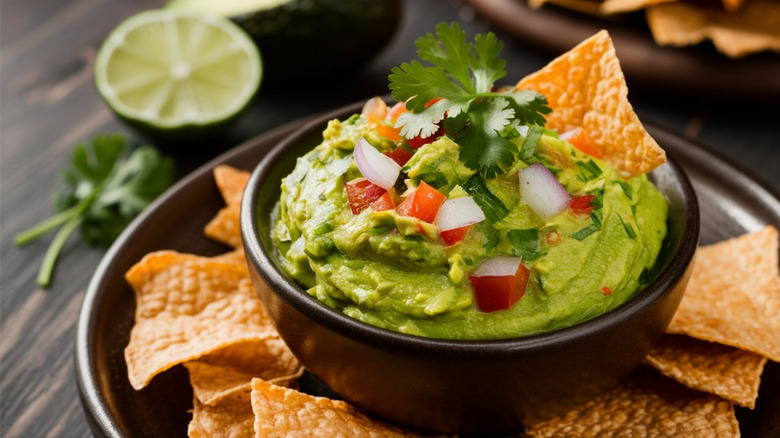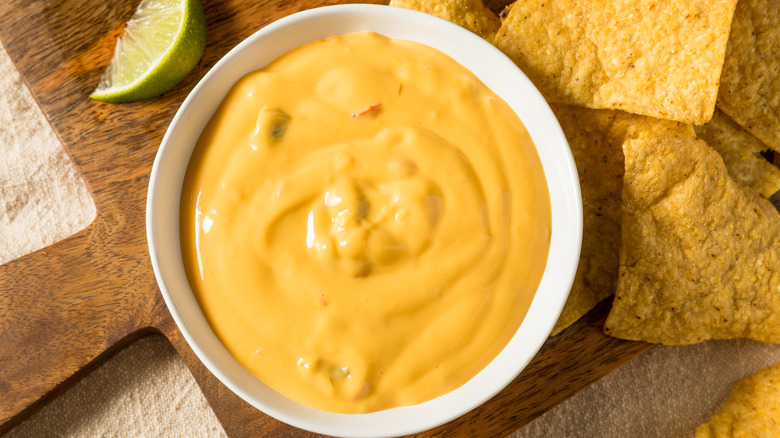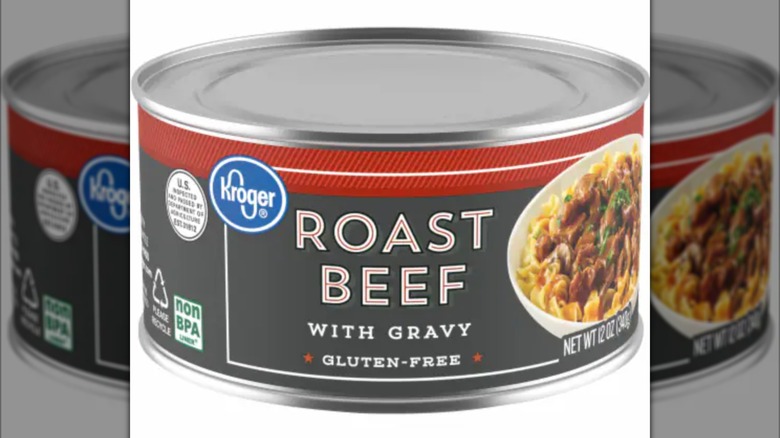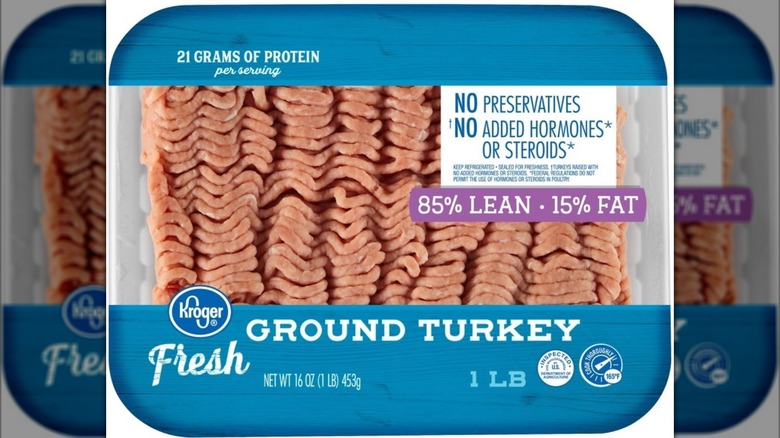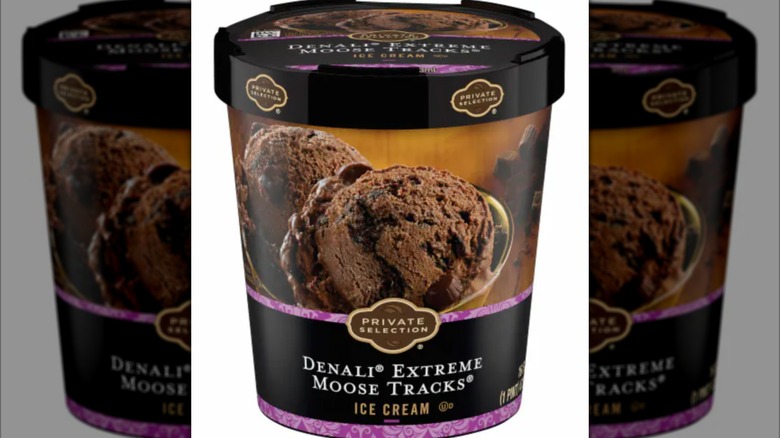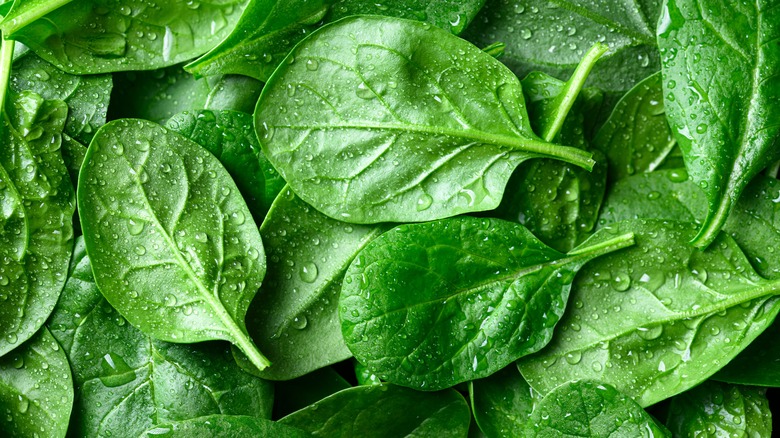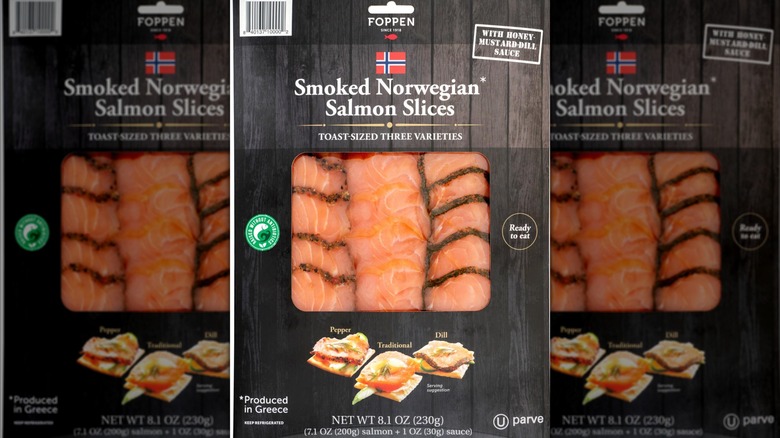14 Food Recalls That Will Always Haunt Kroger
There's no denying that Kroger cares about its food. This supermarket chain has a sense of clear purpose, stating on its website that it aims to make its customers' experiences "as uplifting as possible," and to help them go "from anxiety to inspiration". Unfortunately, there's nothing uplifting or calming about the amount of food recalls it's had to deal with throughout the years. Any major supermarket has to deal with its fair share of potentially contaminated items that have made their way into customer homes, and Kroger's no exception, with multiple items causing it a lot of stress and a lot of paperwork.
In Kroger's case, the company has been particularly impacted by its products potentially containing bacteria or viruses. Listeria, Salmonella, E. coli, and hepatitis pathogens have all been thought to potentially be in Kroger's food at one point or another, resulting in wide-scale recalls. In other cases, these recalls have been prompted by mislabeling. This means food making it into stores containing allergens that might be invisible to the customer, resulting in some potentially big mistakes for those shopping at there. Let's take a dive into Kroger's history, and see how the store has tackled some of its most nightmarish food recalls.
Its kale had to be recalled over a risk of Listeria
Kale may not be to everyone's tastes but it's universally agreed to be good for you, provided it's been handled correctly. Unfortunately, back in 2021 that wasn't quite the case — if you were buying it from Kroger, at least. In September of that year, the store had to put out a recall notice for its 16-ounce bags of kale, because it may have been contaminated with Listeria monocytogenes. The store luckily managed to get the recall out before anyone had become sick, but that didn't make things any less serious.
Kale, along with other leafy produce, is particularly susceptible to being contaminated with Listeria. When you're buying them from major stores, these greens aren't exactly farm to table. Instead, they go through multiple different environments with lots of opportunities to take on the pathogens in their journey from soil to bag, and this can cause severe illness. Leafy greens are especially likely to take on Listeria because it's pretty abundant in soil, where the greens grow. To make matters worse for Kroger, this kale had been shipped to several states in the Eastern and Southeastern regions.
Hepatitis A fears forced a recall of Kroger's frozen berries
When it comes to recalls caused by contamination, the main culprits are usually Listeria and Salmonella bacteria. Hepatitis A is far less common, and it's arguably one of the most dangerous viral illnesses that can be contracted from food. Kroger clearly knows this well, which is why it was so quick to act when a few of its Private Selection frozen berry products were found to have been potentially contaminated with the hepatitis A virus in 2019. These products, manufactured by Townsend Farms for one of Kroger's private brands, were distributed nationwide, causing the supermarket to scramble to get them back before they caused serious illness.
The company was right to do so, as hepatitis A is no joke. The virus travels via food that's been contaminated by the feces of an infected person, and after its incubation period, it can cause inflammation of the liver, according to the World Health Organization. This inflammation can result in severe illness, and while its impact on the liver isn't chronic, in some situations it can lead to death. Luckily, the recall didn't stem from any reports of customer sickness.
The store had to recall its frozen vegetables in 2023
Frozen vegetables are items you don't think twice about buying and throwing into your freezer — but that's kind of an issue when those frozen vegetables may be harmful. Kroger was faced with this problem when it had to recall a wide range of its frozen vegetable products in 2023. In this case, the culprit was corn, which a customer had tested independently after buying one of the products, finding Listeria bacteria in. This corn wasn't just being sold on its own, but was also present in bags of mixed vegetables, meaning that Kroger had to draw up a pretty long list of items to recall.
A serious issue here is that Listeria is capable of surviving in the freezer for a long time. Because most of us work through our frozen vegetables over several weeks or months, this created a huge timespan for potential infection. Things were made even more complicated by the fact that the products didn't have the same best-by date, with a span of almost a full year on the best-by dates of the potentially contaminated items. The good news, however, was that while this recall was extensive in range, it was fairly limited in quantity.
Its ready-to-eat salad bowls contained an undeclared allergen
We generally assume that when a salad product is recalled, it's because it has some kind of nasty bacteria in it. That isn't always the case, though, as Kroger found in 2024 when it had to put out a recall of its Apple Walnut with Chicken Salad bowls. The actual cause of the recall was the potential presence of wheat in the product, which wasn't mentioned on the product label — presenting a significant risk to anybody with a wheat allergy.
It's unclear exactly how the wheat would have made it into the product, or where it might be hiding, but there are a few possibilities. It might have been that a sub-ingredient for the chicken or the dressing contained wheat, and this knowledge didn't make its way up the chain to the company itself. The wheat may have also made its way into the product through cross-contamination. Regardless of how it got in there, the mishap resulted in Kroger having to recall almost 20,000 pounds of the product, which no doubt put a bit of a dent in its finances.
2009's deadly peanut product recall affected Kroger too
While most food recalls pass without incident or cause minor illness to just a few people, others are way more serious. In 2009, Kroger faced one of its most significant and grave challenges, when it put out a peanut-product recall for items made in relation with the Peanut Corporation of America. Kroger was selling several products that were thought to contain peanuts from the corporation, during a time when a massive Salmonella outbreak was sweeping across the U.S. — and which the corporation was being investigated for its part in. At the time of the recall, eight people had sadly lost their lives, and more than 500 others had gotten sick.
The impact of the outbreak was profound. The Peanut Corporation of America was accused of knowingly selling infected food items, and hundreds of companies had to put out recall notices for thousands of products. By the time the outbreak ended, nine people had died. The resulting investigation into the outbreak led to the conviction of Stewart Parnell, an executive at the corporation, for selling peanut products with full knowledge that they were contaminated. Parnell was sentenced to 28 years in prison, with his conviction upheld in 2022.
Kroger's ground beef potentially contained E. coli
Handling raw meat is always a little worrying, but it's even more risky when there might be a chance of contamination. That was exactly what happened in 2022, when Kroger found that it had potentially put its customers at risk of working with ground beef contaminated with E. coli. The company subsequently had to put out a recall of five of its ground beef products, across its regular and Private Selection product lines. Kroger was alerted to this after a customer who had gotten ill submitted a package of previously bought ground beef for testing, and E. coli was found in it.
Given that the recall was put out in April 2022, and the recalled products had a use-by date of December 24, 2021, it's fair to say that it was fairly unlikely any of them would still be floating around. However, Kroger's concern was that some people might have stashed the ground beef in their freezers for future use. Crucially, freezing food contaminated with E. coli doesn't kill it off, but only stops its growth, so the beef may still have been harmful months after it was frozen.
In 2018, raw shrimp was mislabeled as cooked
Recalls due to mislabeling are pretty common, but they usually occur because an ingredient has been missed from the list. It's less common for them to happen when the item inside is cooked the wrong way — or not cooked at all. Sadly, in 2018, Kroger had to deal with this reality when nine of its shrimp products had to be recalled. The reason? The label listed them as being cooked, but that wasn't entirely true: The shrimp was instead either raw or undercooked.
Eating raw shrimp may not seem like the biggest deal in the world, but aside from being a pretty gross experience when you're planning on biting into something cooked, it can also be dangerous. Like any seafood or meat product, raw shrimp carries a risk of contamination from various different microbes. Fully cooking the shrimp helps to minimize the risk of these microbes making it onto your plate. Given that Kroger's shrimp had spread far and wide, the store faced a pretty big challenge to get it back. Luckily, it didn't appear to cause any illness to people who bought the products.
A listeria risk caused a recall of dips and vegetables
How harmful can a dip be? As it turns out, pretty harmful if it hasn't been correctly handled. In 2024, routine sampling conducted by the Michigan Department of Agriculture and Rural Development (MDARD) found potential Listeria contamination in a range of Supreme Produce dips, a product line sold by Kroger. Although nobody had gotten sick from eating the dips, the supermarket reacted quickly, putting out a recall notice for products which had been distributed to stores in five different states.
The issue that Kroger faced with this recall is that it wasn't just one or two dips that it had to track down. Almost 20 individual products were thought to be potentially contaminated, with a range of pico de gallos, guacamoles, and salsas being impacted by the possible presence of Listeria. As well as this, a variety of different grab-and-go vegetable products, like diced jalapeños and vegetable kabobs, were also impacted by the potential contamination and had to be recalled. Honestly, we wouldn't have wanted to be in charge of trying to find all of those, and wouldn't blame anyone for wanting to make their own pico de gallo instead, after learning about this.
Cheese dips contained potentially contaminated onions
Few things hit the spot like a cheese dip. Call us old-fashioned, though, but we kinda like ours to be free of any contaminants. We're betting that Kroger does too, which is why it was likely quite troublesome for the supermarket chain to have to face up to the fact that its cheese dips may have contained contaminated onions in 2020. During the height of COVID-19, the retail giant was trying to put out an illness fire of its own, after it discovered that its cheese dips were made with onions from Thomson International, Inc., which was embroiled in a Salmonella outbreak that had caused over 1,600 illnesses and many hospitalizations.
This recall was further complicated by the fact that the potential contamination affected dozens of its dips, which had been sold over several months, making the task of finding them all almost impossible. Kroger wasn't the only retailer affected by this outbreak, either. Other companies like Fred Meyer Stores and HelloFresh had also used onions from Thomson International Inc., and were conducting recalls of their very own. Thankfully, by October 2020 the outbreak had ended, but it's no exaggeration to say that it had a lasting impact on consumer confidence.
Kroger's canned roast beef was found to contain lead
What do you want in your food? Probably some good flavor and a little bit of nutritional value, right? Well, what about lead? We're willing to guess that one isn't high on your priority list, due to the fact that lead poisoning can quite literally kill you. However, in 2021, Kroger found itself in the sticky situation of having to ask customers to return its canned roast beef with gravy, due to the presence of lead in the food.
It's easy to assume that the lead came from the can that the beef was packaged in, but that wasn't quite the case. The lead's source was actually a spice mix, which unsafe levels of the metal had been found in. Although dietary lead exposure has decreased massively in the last few decades, it's unfortunately still able to get into our food through the environment that it's grown or processed in, with environmental pollution being the root cause. Kroger was just one of several stores affected by this recall, and a total of over 684,000 pounds of canned beef with gravy was recalled by manufacturer Crider Foods.
Ground turkey was recalled by Kroger for containing plastic
It's hard to get ground turkey wrong, but somehow in 2021 one company managed to do so. That year, Turkey giant Butterball had to put out a recall notice for two of its ground turkey products, one of which was a Kroger exclusive, with the recall quantity coming in at over 14,000 pounds. It all started when customers started complaining to the Food Safety and Inspection Service, stating that they found pieces of blue plastic in the meat. Yum!
Finding plastic in ground or processed meat is depressingly common, and usually occurs because a piece of plastic has somehow found its way into the grinder, ending up fully incorporated with the meat itself. These pieces of plastic can detach themselves from machinery or simply find their way in there due to human error, with workers dropping or leaving spatulas or scrapers where they shouldn't. Because these ground turkey products were shipped nationwide, this recall was a bit more complicated to conduct, but thankfully it didn't look as though anybody was injured by the plastic they found.
Mislabeled Kroger ice cream contained undeclared peanuts
Everyone likely knows how severe peanut allergies can be, which is why food companies are so careful to highlight when their foods contain them. That's also why it was so frightening when Kroger failed to declare peanuts as an allergen on tubs of its Private Selection Denali Extreme Moose Tracks Ice Cream back in 2014. Containers of the ice cream made it to 13 different states before the supermarket chain was alerted of the labeling error, prompting the recall.
Fortunately for Kroger, while the mislabeled tubs made it far and wide, the scale of the problem was still fairly limited. The affected tubs all seemed to be produced on a single day, and had just one sell-by date, making identifying them pretty easy. It was also very lucky that no allergic reactions had prompted the recall. Amazingly, this massive error didn't prevent Kroger from making the same mistake just two years later. In 2016, its Deluxe S'mores Ice Cream also had to be recalled because — you guessed it! — peanuts weren't listed on the ingredients list.
Kroger recalled spinach for potential Listeria contamination
Spinach is usually what we reach for when we want something a little extra healthy but, back in 2012, reaching for it at Kroger may have made you seriously ill. Kroger had to put out a recall notice in September of that year, due to potential contamination from Listeria monocytogenes. This was no small-scale recall, either. While Kroger may not operate in every state, this spinach had been shipped to 15 of those with its stores, including Virginia, Georgia, Michigan, Tennessee, and Ohio.
It wasn't just Kroger flagship stores that were affected, either. The spinach had also been shipped to other stores including Jay C, Food 4 Less, Scott's, and Owen's. Thankfully, Kroger seemed to contain the issue before it turned into a full-blown Listeriosis outbreak — and that's a good thing, too. Listeriosis can cause a wide range of unpleasant symptoms, including fever, diarrhea, nausea, and vomiting, with severe symptoms potentially causing sepsis, meningitis, or encephalitis. In the worst cases, it can be fatal.
Smoked salmon slices were recalled over bacterial contamination
Listeria contamination is a common cause for Kroger's food recalls (honestly, you'd kinda think they'd get a handle on it), and this was proved yet again in 2024. This time, Kroger had to seek out and recall a smoked salmon product that it sold in its Kroger and Pay Less stores. The packs of Smoked Norwegian Salmon Slices were made by Foppen Seafood, produced in the Netherlands, and were recalled after routine testing discovered that there was Listeria bacteria present in the product.
The silver lining for Kroger was that the bacteria was only discovered in one specific lot, making the potential for contamination and illness fairly isolated. What ruined this silver lining, though, was that the smoked salmon had been shipped far and wide. Both Foppen and Kroger acted quickly to try and seek a resolution, but we've gotta be honest — we're probably not gonna be making our favorite smoked salmon quiche with this brand for a while.
